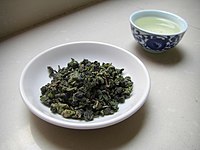Tieguanyin
| Tieguanyin 鐵觀音 |
|
|---|---|
 |
|
| Type | Oolong |
|
|
|
| Other names | Iron Goddess, Iron Guanyin, Ti Kuan Yin, Tiet Kwun Yum |
| Origin | Anxi County, Fujian Province, China and others |
|
|
|
| Quick description | The harvests in spring (also known as Jade) and autumn are most prized for the fruity, sometimes even berry taste and aroma |
|
|
|
| Temperature | 90–95 °C |
Tieguanyin (simplified Chinese: ; traditional Chinese: ; pinyin: tiěguānyīn; Jyutping: tit3 gun1 jam1; Pe̍h-ōe-jī: Thih-koan-im; literally: "Iron Goddess of Mercy"; Standard Chinese pronunciation [tʰjè.kwán.ín]) is a premium variety of Chinese oolong tea originated in the 19th century in Anxi in Fujian province. Tieguanyin produced in different areas of Anxi have different gastronomic characteristics.
The tea is named after the Chinese Goddess of Mercy Guanyin, who is known in Japan as Kannon and in Korea as Gwan-eum. Guanyin is a female embodiment of Avalokiteśvara Bodhisattva. Other spellings and names include "Ti Kuan Yin", "Tit Kwun Yum", "Ti Kwan Yin", "Iron Buddha", "Iron Goddess Oolong", and "Tea of the Iron Bodhisattva". It is also known in the abbreviated form as "TGY".
There are two legends behind this tea: Wei and Wang.
Deep in the heart of Fujian's Anxi County, there was a rundown temple which held an iron statue of Guanyin, the Bodhisattva of Compassion. Every day on the walk to his tea fields, a poor farmer named Wei would pass by and reflect on the temple's worsening condition. “Something has to be done,” he thought.
Being poor, Wei did not have the means to repair the temple. One day, he brought a broom and some incense from his home. He swept the temple clean and lit the incense as an offering to Guanyin. "It's the least I can do," he thought to himself. And he did this twice a month for many months.
...
Wikipedia

